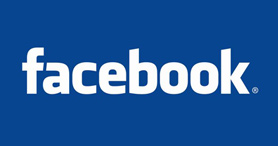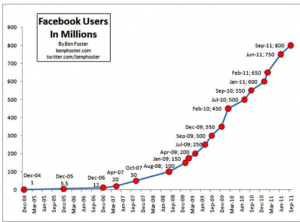Difference between revisions of "Facebook"
(Editing mk 1 - style and some content. Looking for citations.) |
|||
| Line 1: | Line 1: | ||
[[File:Fb_logo1.jpg|frame|Facebook logo]] | [[File:Fb_logo1.jpg|frame|Facebook logo]] | ||
| − | '''Facebook''' is | + | '''Facebook''' is a revolutionary social-networking site founded in 2004. Facebook users share their identity - to a certain extent their sense of self - and personal information with their online social network through their Profile. Everything that a user posts to Facebook is the property of the user, but with regard to intellectual property, the user gives Facebook a “non-exclusive, transferable, sub-licensable, royalty-free, worldwide license to use any IP content that you post on or in connection with Facebook” <ref name="Facebook terms of service">http://www.facebook.com/legal/terms</ref>. While a user owns the information, Facebook is able to mine that information in order to offer personalized advertisements to users, and generate revenue from users' personal information. |
==History== | ==History== | ||
| − | Mark Zuckerberg | + | Mark Zuckerberg developed a site called Facemash while he was an undergraduate at Harvard. The site displayed four photos of Harvard university students, two males and two females, and prompted the user to vote on which out of each pair was "hotter." <ref>http://en.wikipedia.org/wiki/Facemash#Facemash</ref> As Zuckerberg retreived these photos from a protected University database, he faced legal and academic repercussions. |
| − | + | Zuckerman's next online social venture, thefacebook.com, was launched in February of 2004. Cameron Winklevoss, Tyler Winklevoss, and Divya Narendra accused Zuckerberg of misleading them, as he had agreed to help them build a similar website, Harvard Connection. The website immediately took off, with almost half of Harvard students registering for the site within the first month it was active. One month later, Zuckerberg expanded registration to Columbia, Stanford, and Yale, with most other colleges and universities coming shortly after that. In 2005, Zuckerberg dropped the "the" from the name, making it simply facebook.com. In September 2005, registration became open to all high school students, requiring an invitation to join. Facebook kept expanding, until September 2006 when it was opened up to anyone over the age of thirteen with a valid email address. Facebook is now planning their IPO, scheduled to come out by 2013. | |
== Facebook Features == | == Facebook Features == | ||
| − | Through | + | Through user Profiles, users are able to share their photos, interests, and personal information to their social network. Users are able to communicate to each other by posting publicly on ‘friends’ walls, sending private messages to other users and chatting with ‘friends’ through Facebook chat/messages. Recently Facebook introduced two new features: Timeline and Frictionless Sharing. Timeline will modify the user profile to focus on more significant events and span a longer period of time than it currently does. Frictionless sharing integrates third-party products with Facebook, and shares information between them. For example, connecting Spotify to Facebook lets you see your friends' playlists within Spotify, and posts the songs that you've listened to to Facebook. |
== Ethical concerns surrounding Facebook == | == Ethical concerns surrounding Facebook == | ||
| Line 14: | Line 14: | ||
=== Information Transparency === | === Information Transparency === | ||
| − | It is unclear how Facebook uses the information that they collect to provide personalized to individual users. | + | It is unclear how Facebook uses the information that they collect to provide personalized to individual users. Furthermore, it is unclear exactly what information Facebook is collecting. Do they keep track of every single time a user logs in or out. |
=== Other Ethical Considerations === | === Other Ethical Considerations === | ||
| Line 20: | Line 20: | ||
=== Federal Trade Commission === | === Federal Trade Commission === | ||
| − | On November 29, 2011, Facebook and the Federal Trade Commission came to an agreement regarding the protocol of protecting users' rights to privacy. | + | On November 29, 2011, Facebook and the Federal Trade Commission came to an agreement regarding the protocol of protecting users' rights to privacy. The settlement addressed concerns that Facebook was not upholding "the promises about privacy that it makes to its hundreds of millions of users."<ref name = "ftc">http://www.ftc.gov/opa/2011/11/privacysettlement.shtm Federal Trade Commission</ref> |
'''Complaints'''<ref name= "ftc" /> | '''Complaints'''<ref name= "ftc" /> | ||
| Line 58: | Line 58: | ||
|50 million | |50 million | ||
|- | |- | ||
| − | | | + | |2008IPO |
|100 million | |100 million | ||
|- | |- | ||
Revision as of 02:54, 6 December 2011
Facebook is a revolutionary social-networking site founded in 2004. Facebook users share their identity - to a certain extent their sense of self - and personal information with their online social network through their Profile. Everything that a user posts to Facebook is the property of the user, but with regard to intellectual property, the user gives Facebook a “non-exclusive, transferable, sub-licensable, royalty-free, worldwide license to use any IP content that you post on or in connection with Facebook” [1]. While a user owns the information, Facebook is able to mine that information in order to offer personalized advertisements to users, and generate revenue from users' personal information.
Contents
History
Mark Zuckerberg developed a site called Facemash while he was an undergraduate at Harvard. The site displayed four photos of Harvard university students, two males and two females, and prompted the user to vote on which out of each pair was "hotter." [2] As Zuckerberg retreived these photos from a protected University database, he faced legal and academic repercussions.
Zuckerman's next online social venture, thefacebook.com, was launched in February of 2004. Cameron Winklevoss, Tyler Winklevoss, and Divya Narendra accused Zuckerberg of misleading them, as he had agreed to help them build a similar website, Harvard Connection. The website immediately took off, with almost half of Harvard students registering for the site within the first month it was active. One month later, Zuckerberg expanded registration to Columbia, Stanford, and Yale, with most other colleges and universities coming shortly after that. In 2005, Zuckerberg dropped the "the" from the name, making it simply facebook.com. In September 2005, registration became open to all high school students, requiring an invitation to join. Facebook kept expanding, until September 2006 when it was opened up to anyone over the age of thirteen with a valid email address. Facebook is now planning their IPO, scheduled to come out by 2013.
Facebook Features
Through user Profiles, users are able to share their photos, interests, and personal information to their social network. Users are able to communicate to each other by posting publicly on ‘friends’ walls, sending private messages to other users and chatting with ‘friends’ through Facebook chat/messages. Recently Facebook introduced two new features: Timeline and Frictionless Sharing. Timeline will modify the user profile to focus on more significant events and span a longer period of time than it currently does. Frictionless sharing integrates third-party products with Facebook, and shares information between them. For example, connecting Spotify to Facebook lets you see your friends' playlists within Spotify, and posts the songs that you've listened to to Facebook.
Ethical concerns surrounding Facebook
There are several ethical implications regarding Facebook’s use of user information.
Information Transparency
It is unclear how Facebook uses the information that they collect to provide personalized to individual users. Furthermore, it is unclear exactly what information Facebook is collecting. Do they keep track of every single time a user logs in or out.
Other Ethical Considerations
Several applications such as Spotify require that a user have a Facebook account in order to use that application. Such requirements don’t give users a choice and to a certain extent monopolize the Facebook platform.
Federal Trade Commission
On November 29, 2011, Facebook and the Federal Trade Commission came to an agreement regarding the protocol of protecting users' rights to privacy. The settlement addressed concerns that Facebook was not upholding "the promises about privacy that it makes to its hundreds of millions of users."[3]
Complaints[3]
- In December 2009, Facebook changed its website so certain information that users may have designated as private – such as their Friends List – was made public. They didn't warn users that this change was coming, or get their approval in advance.
- Facebook represented that third-party apps that users' installed would have access only to user information that they needed to operate. In fact, the apps could access nearly all of users' personal data – data the apps didn't need.
- Facebook told users they could restrict sharing of data to limited audiences – for example with "Friends Only." In fact, selecting "Friends Only" did not prevent their information from being shared with third-party applications their friends used.
- Facebook had a "Verified Apps" program & claimed it certified the security of participating apps. It didn't.
- Facebook promised users that it would not share their personal information with advertisers. It did.
- Facebook claimed that when users deactivated or deleted their accounts, their photos and videos would be inaccessible. But Facebook allowed access to the content, even after users had deactivated or deleted their accounts.
- Facebook claimed that it complied with the U.S.- EU Safe Harbor Framework that governs data transfer between the U.S. and the European Union. It didn't.
Settlement[3]
- Specifically, under the proposed settlement, Facebook is:
- barred from making misrepresentations about the privacy or security of consumers' personal information;
- required to obtain consumers' affirmative express consent before enacting changes that override their privacy preferences;
- required to prevent anyone from accessing a user's material more than 30 days after the user has deleted his or her account;
- required to establish and maintain a comprehensive privacy program designed to address privacy risks associated with the development and management of new and existing products and services, and to protect the privacy and confidentiality of consumers' information; and
- required, within 180 days, and every two years after that for the next 20 years, to obtain independent, third-party audits certifying that it has a privacy program in place that meets or exceeds the requirements of the FTC order, and to ensure that the privacy of consumers' information is protected.
Facebook usage in the past years
| Year | Total Facebook Users In Millions |
| 2004 | 1 million |
| 2005 | 5.5 million |
| 2006 | 12 million |
| 2007 | 50 million |
| 2008IPO | 100 million |
| 2009 | 250 million |
| 2010 | 550 million |
| 2011 | 800 million |

